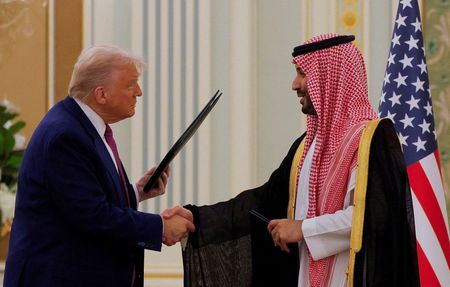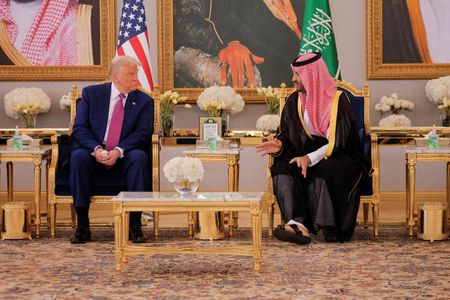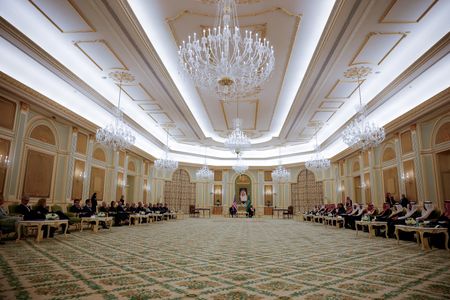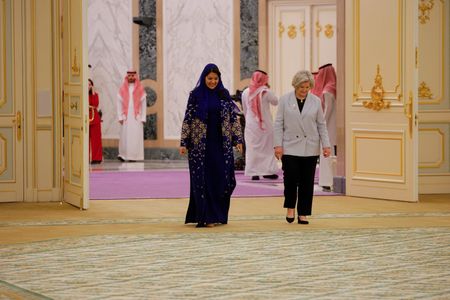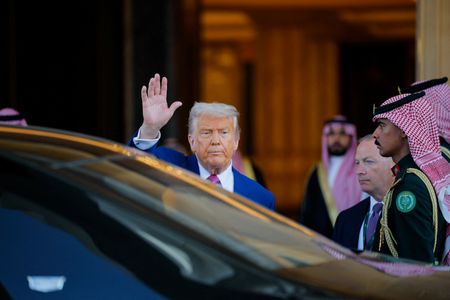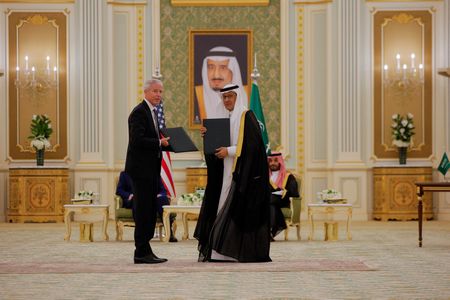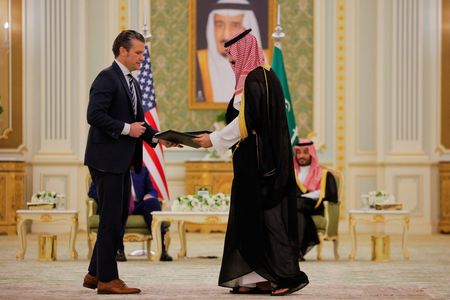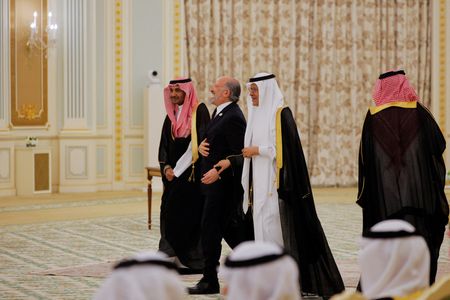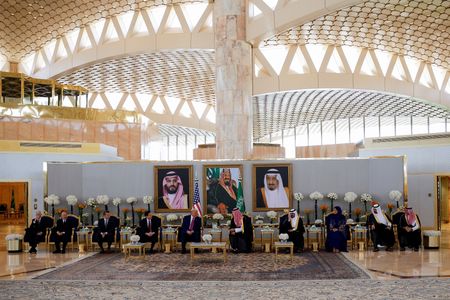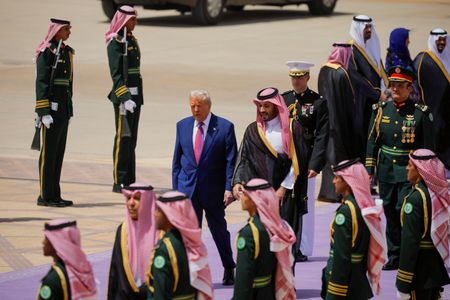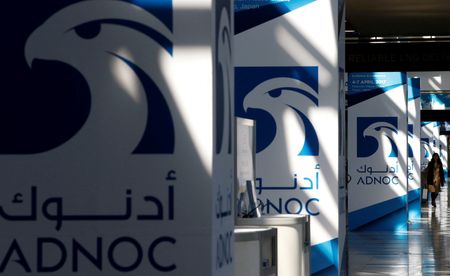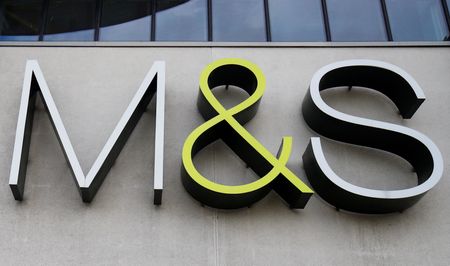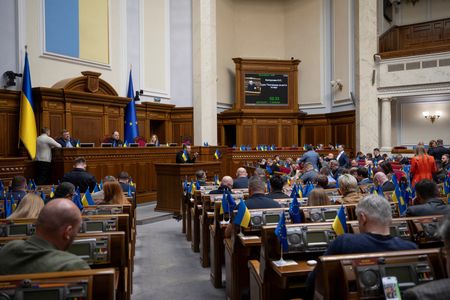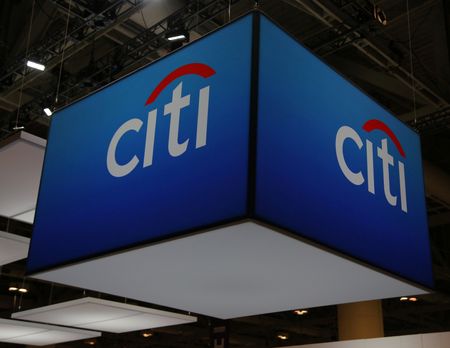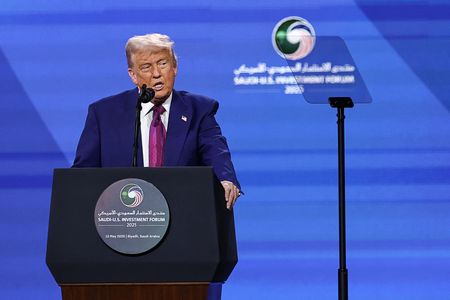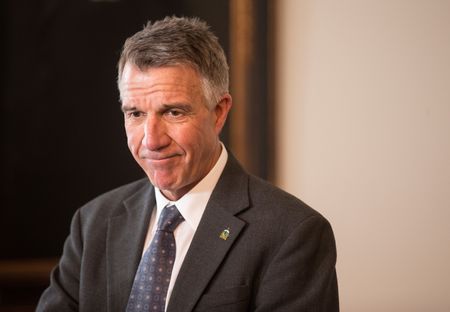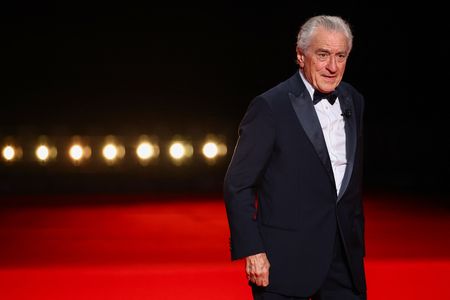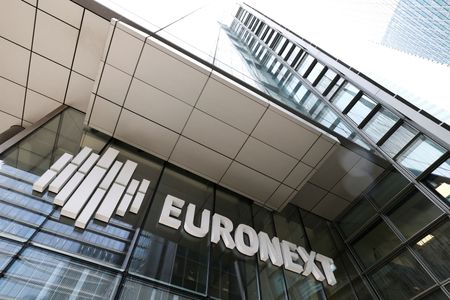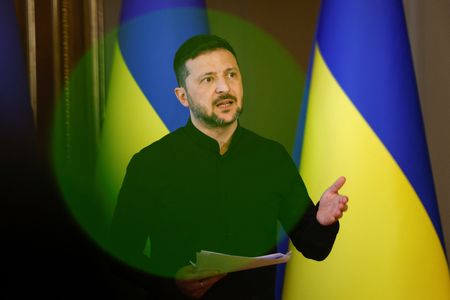By Yousef Saba, Gram Slattery, Pesha Magid and Nafisa Eltahir
RIYADH (Reuters) -President Donald Trump kicked off his trip to the Gulf on Tuesday with a surprise announcement that the United States will lift long-standing sanctions on Syria, and a $600 billion commitment from Saudi Arabia to invest in the U.S.
The U.S. agreed to sell Saudi Arabia an arms package worth nearly $142 billion, according to the White House which called it the largest “defense cooperation agreement” Washington has ever done.
The end of sanctions on Syria would be a huge boost for a country that has been shattered by more than a decade of civil war. Rebels led by current President Ahmed al-Sharaa toppled President Bashar al-Assad last December.
Speaking at an investment forum in Riyadh at the start of a deals-focused trip that also brought a flurry of diplomacy, Trump said he was acting on a request to scrap the sanctions by Saudi Arabia’s de facto ruler, Prince Mohammed bin Salman.
“Oh what I do for the crown prince,” Trump said, drawing laughs from the audience. He said the sanctions had served an important function but that it was now time for the country to move forward.
The move represents a major U.S. policy shift. The U.S. declared Syria a state sponsor of terrorism in 1979, added sanctions in 2004 and imposed further sanctions after the civil war broke out in 2011.
Syrian Foreign Minister Asaad al-Shibani said on X that the planned move marked a “new start” in Syria’s path to reconstruction. Trump has agreed to briefly greet Sharaa in Saudi Arabia on Wednesday, a White House official said.
Trump and the Saudi crown prince signed an agreement covering energy, defense, mining and other areas. Trump has sought to strengthen relations with the Saudis to improve regional ties with Israel and act as a bulwark against Iran.
The agreement covers deals with more than a dozen U.S. defense companies for areas including air and missile defense, air force and space, maritime security and communications, a White House fact sheet said.
It was not clear whether the deal included Lockheed F-35 jets, which sources say have been discussed. The Saudi prince said the total package could reach $1 trillion when further agreements are reached in the months ahead.
Saudi Arabia is one of the largest customers for U.S. arms, and the two countries have maintained strong ties for decades based on an arrangement in which the kingdom delivers oil and the superpower provides security.
But relations were strained after the 2018 murder of U.S.-based Saudi journalist Jamal Khashoggi by Saudi agents in Istanbul caused a global uproar. U.S. intelligence concluded that bin Salman approved an operation to capture or kill Khashoggi, a prominent critic, but the Saudi government has denied any involvement.
Trump did not mention the incident during his visit and called bin Salman an “incredible man.”
“I really believe we like each other a lot,” Trump said.
Trump will go on from Riyadh to Qatar on Wednesday and the United Arab Emirates on Thursday in a trip that is focused on investment rather than security matters in the Middle East.
Several U.S. business leaders attended the event, including Elon Musk, the Tesla chief who has led a government-downsizing effort for Trump in Washington; OpenAI CEO Sam Altman; BlackRock CEO Larry Fink and Blackstone CEO Stephen Schwarzman.
Trump was shown speaking with several Saudi officials, including sovereign wealth fund governor Yasir al-Rumayyan, Aramco CEO Amin Nasser and investment minister Khalid al-Falih as he viewed models for the kingdom’s flashy, multi-billion-dollar development projects.
Bin Salman has focused on diversifying the Saudi economy in a major reform program dubbed Vision 2030 that includes “Giga-projects” such as NEOM, a futuristic city the size of Belgium. Oil generated 62% of Saudi government revenue last year.
The kingdom has scaled back some of its ambitions as rising costs and falling oil prices weigh.
NO VISIT TO ISRAEL, WARNING TO IRAN
Trump has not scheduled a stop in Israel, raising questions about where the close ally stands in Washington’s priorities as Trump presses Israeli Prime Minister Benjamin Netanyahu to agree to a new ceasefire deal in the 19-month-old Gaza war.
Israel’s military operations against Hamas in Gaza and Hezbollah in Lebanon, and its assassinations of the two Iran-allied groups’ leaders, have at the same time given Trump more leverage by weakening Tehran and its regional allies.
Trump said it was his “fervent hope” that Saudi Arabia would soon normalize relations with Israel, following other Arab states that did so during his first 2017-2021 term. “But you’ll do it in your own time,” he said.
Netanyahu’s opposition to the creation of a Palestinian state makes progress with the Saudis unlikely, sources told Reuters.
Trump on Tuesday called Iran “the most destructive force” in the Middle East and warned that the U.S. will never allow it to obtain a nuclear weapon. He said he was willing to strike a new deal with the Islamic Republic but only if its leaders changed course.
“I want to make a deal with Iran,” he said. “But if Iran’s leadership rejects this olive branch… we will have no choice but to inflict massive maximum pressure.”
(Reporting by Gram Slattery, Pesha Magid, Yousef Saba, Federico Maccioni and Nafisa Eltahir in Riyadh and Maha El Dahan in Dubai; writing by Michael Georgy and Andy Sullivan; editing by Timothy Heritage, Colleen Jenkins, Mark Heinrich and Alistair Bell)

